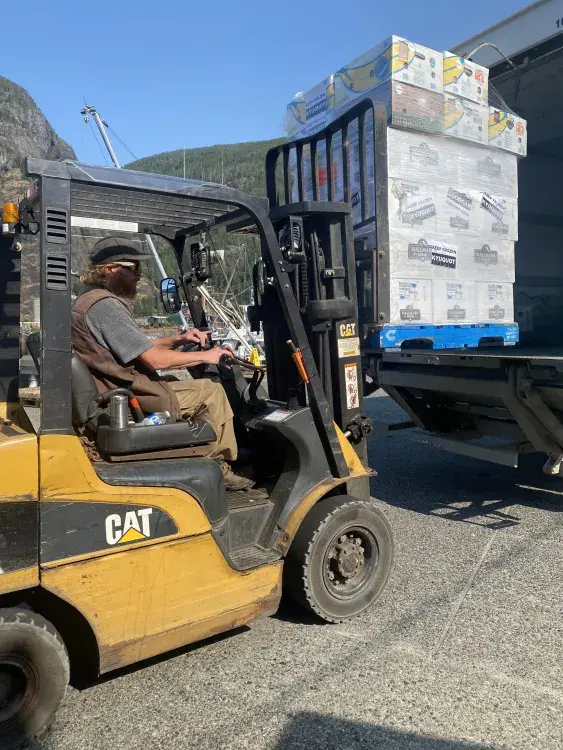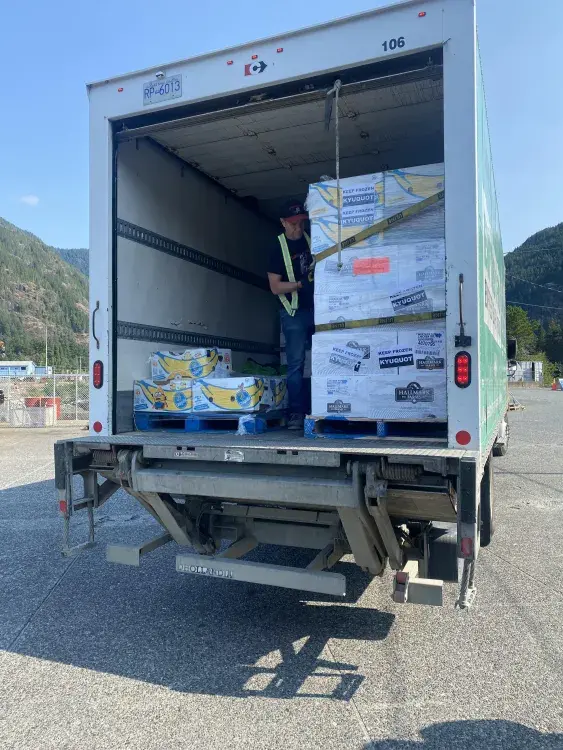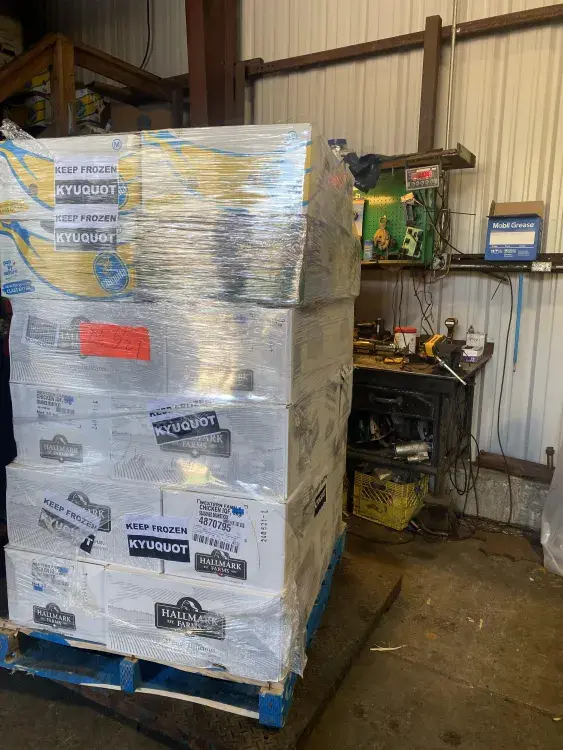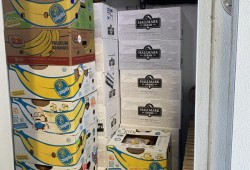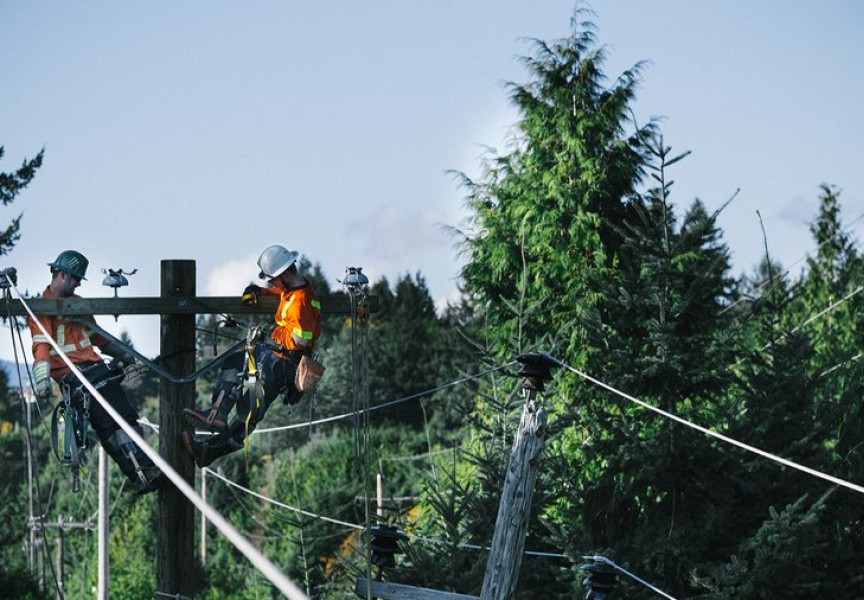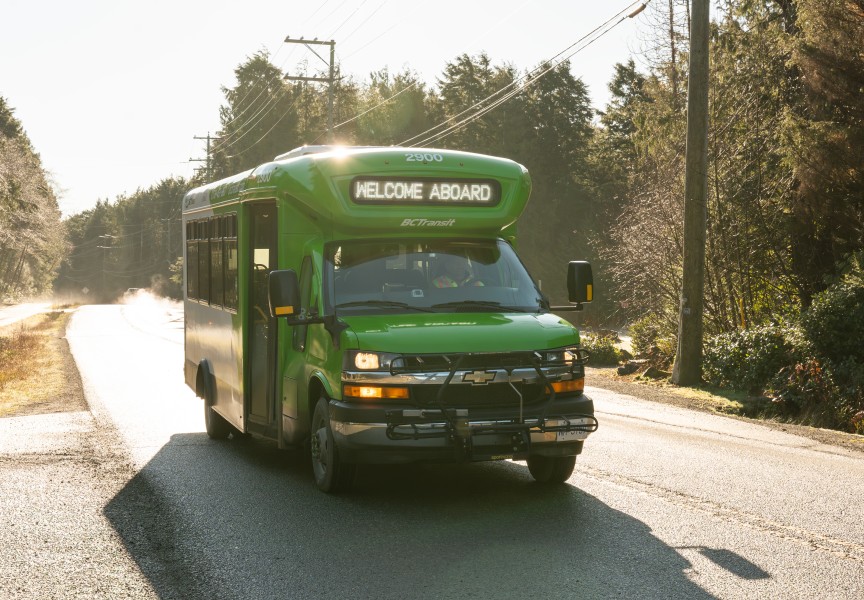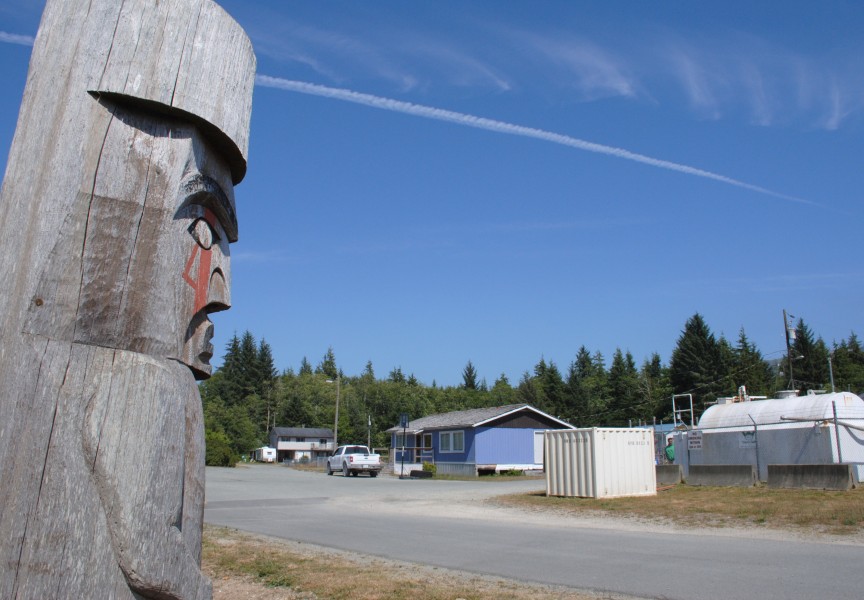On July 26, Rachel Blaney, NDP MP for North Island-Powell River, joined Loaves and Fishes Community Food Bank on their monthly journey to deliver to Kyuquot, Gold River, and Tahsis, pointing to the need for essential food items in remote communities.
For Ka:'yu:'k't'h' / Che:k'tles7et'h' First Nations, their home territories are only accessed by air or water.
With roughly 200 residents living in the remote community, Colleen Rudderham, director of Community Services for Ka:'yu:'k't'h' / Che:k'tles7et'h' First Nations (KCFN) and Tracy Moulaison, director of Operations for KCFN, said that receiving food donations “provides accessibility, affordability, and availability to members in our community.”
The closest grocery store to Kyuquot is in Port McNeill, they wrote to Ha-Shilth-Sa. For 30-minutes residents must travel to Fair Harbour by boat, then drive roughly two hours to Port McNeill.
“Arrangements must be made for a water taxi which [is estimated] between $300 and $500,” shared Rudderham and Moulaison. “The cost of gas is $200.”
“Not everyone in the community has a boat or a vehicle to get their groceries. This always takes coordination on the member's part to get what they need,” they wrote. “This can be taxing on families by having to wait a long time to get what they need.”
“Fair Harbour does their best to supply fresh fruit and vegetables and some necessities but again, you need a water taxi and it's expensive,” they continued, adding that the General Store on Walters Island across from Kyuquot is also expensive and open just a few days a week.
Since 2017, the Society of Saint Vincent de Paul has been delivering food to surrounding remote communities in pickup trucks, shared Paul Bertrand, a former president of the Campbell River conference. But when the society joined forces with Loaves and Fishes, it changed the game of delivering essential foods to Tahsis, Zeballos, and Gold River, with Kyuquot being the newest addition to their delivery route as of this year.
According to Bertrand roughly 72 adults and 20 children living in Kyuquot receive food assistance from Loaves and Fishes and the Society of Saint Vincent de Paul.
“They're a godsend,” said Bertrand, of Loaves and Fishes. “We didn't have transportation. What people were doing [was] coming in with pickup trucks and we were loading food on pickup trucks.”
Now, the Society of Saint Vincent de Paul is able to contribute $1,800 worth of fresh meat products with Loaves and Fishes’ five-tonne refrigerated delivery truck, shared Bertrand.
“We would like to get more funding and supply fresh vegetables and fruit,” Bertrand noted.
Abby Sauchuk, director of development for Loaves and Fishes, shared with Ha-Shilth-Sa that the trucks are typically delivering fresh food such as produce, dairy, as well as meat.
“We try to deliver things that they normally wouldn't have easy access to,” she said.
“We are very grateful for these two organizations because now, we are able to have our own food bank where members can come and take what they need on a weekly or as-need basis,” wrote Rudderham and Moulaison.
But the demand for accessible, affordable, and available food items extends further than Kyuquot.
“I met one woman in Tahsis who told me that if it wasn’t for this program with Loaves and Fishes, she didn’t know how she’d get enough food,” said Blaney in a recent press release. “The nearest large grocery store is in Campbell River, but her vehicle is broken down and [is] too expensive to repair. She can’t get to Campbell River, so without Loaves and Fishes it would be hard to get the supplies she needs.”
Similarly, Sauchuk shared with Ha-Shilth-Sa feedback from Gold River.
“The representatives we deal with in Gold River told me that more than half the town has used the food bank services at one point,” said Sauchuk. “The need is quite real out there.”
According to Food Banks Canada, there was a 32 per cent increase in food bank visits across the country when comparing March 2023 to March 2022. But, even more staggering is the 78.5 per cent increase from March 2019 to 2023.
Thirty-three per cent of those who use food banks across Canada are children. While 43.8 per cent are single-parent households and 42.4 per cent are those who use “disability-related supports” or social assistance.
Loaves and Fishes Community Food Bank currently serves over 44 communities across Vancouver Island and 15 of those are Indigenous settlements.
The organization has successfully diverted $9 million worth of “good food” from across Vancouver Island in 2023 that would have otherwise gone to waste, shared Sauchuk.
“We're collecting about 25 per cent of the food that's getting thrown out on Vancouver Island,” said Sauchuk, based on the data collected by Loaves and Fishes.
“The majority of the food that we're delivering out there… is perfectly fine to eat, but it would have gone to a dumpster in a larger community centre,” she said. “We're just taking food that is good, that people didn't buy, and then just diverting it out to make sure that it goes to people in need rather than to landfills.”
The organization collects food seven days a week at every major grocery store in Nanaimo, where their central warehouse is located. They are also collecting daily in Parksville, Qualicum Beach, Ladysmith, Chemainus, Port Hardy and Port Alberni, shared Sauchuk. On statutory holidays, they collect in Comox and Courtenay, she added.
“That's 350,000 pounds of food a month we're running through our warehouse,” said Sauchuk. “But we can't do more because we just don't have the space.”
Loaves and Fishes aspires to build a 25,000-square-foot warehouse but require a remaining $7 million in funding in order to “break ground”. This is in addition to the funding they have already received from the provincial government, the City of Nanaimo, and the Regional District of Nanaimo.
With the additional space, Sauchuk shared that the organization plans to “increase these deliveries and the amounts of food that we’re bringing out.”
“What Loaves and Fishes has done, which is remarkable, is they’ve found a way to partner with many businesses and nonprofits to redistribute food to communities that are often underserved,” said Blaney in the recent press release. “They provide crucial food supplies to communities that might only be served by helicopter or by logging road, so they don’t often have access to a lot of resources. When times are tough, these communities are hit hard.”
“There’s still lots more to do,” said Sauchuk.

